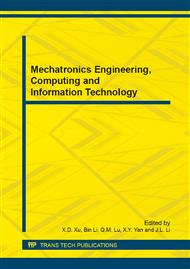[1]
Ni, Z. R., Wang, Y. P. 2001. Architecture and technical framework of weapon system of systems laboratory. Military Operational Research and System Engineering 3: 28-31.
Google Scholar
[2]
Q. -S. Zhao, Research on methods of weapon and equipment SoS requirement description based on semantic model and its application, Ph. D. dissertation, Department of Management, National University of Defense Technology, Changsha, China, (2008).
Google Scholar
[3]
L. -L. Chang, Method research on technology contribution rate evaluation of weapon system of systems, Master dissertation, Department of Management, National University of Defense Technology, Changsha, China, (2010).
Google Scholar
[4]
L. -L. Chang, Y. -J. Lu, Q. -S. Zhao, J. Jiang, Technology System of Systems: concepts and hierarchical structure" in Proc. 7th International Conf. on System of System Engineering, Genova, 2012, p.297–301.
DOI: 10.1109/sysose.2012.6384159
Google Scholar
[5]
L. -L. Chang, Y. -J. Lu, Q. -S. Zhao, J. Jiang, Multi-view and network modeling for Technology System of Systems" in Proc. 3th International. Conf. on System Science and Engineering, Dalian, 2012, p.297–301.
Google Scholar
[6]
J. -B. Yang. Rule and utility based evidential reasoning approach for multiple attribute decision analysis under uncertainty, European Journal of Operational Research, vol. 131, 2001, pp.31-61.
DOI: 10.1016/s0377-2217(99)00441-5
Google Scholar
[7]
J. -B. Yang, D. -L. Xu, Nonlinear information aggregation via evidential reasoning in multiattribute decision analysis under uncertainty, IEEE Transactions on Systems, Man, and Cybernetics, vol. 32, 2002, pp.376-393.
DOI: 10.1109/tsmca.2002.802809
Google Scholar
[8]
J. Jiang, X. Li, Z. Zhou, D. Xu, Y. Chen, Weapon system capability assessment under uncertainty based on the evidential reasoning approach, Expert Systems with Applications, vol. 38, 2011, pp.13773-13784.
DOI: 10.1016/j.eswa.2011.04.179
Google Scholar
[9]
J. -B. Yang, J. Liu, J. Wang, H. S. Sii, H. -W. Wang, Belief rule-based inference methodology using the evidential reasoning approach, IEEE Transactions on Systems, Man, and Cybernetics, vol. 36, 2006, pp.266-285.
DOI: 10.1109/tsmca.2005.851270
Google Scholar
[10]
D. -L. Xu, J. -B. Yang, Intelligent decision system for self-assessment, Journal of Multi-Criteria Decision Analysis, vol. 12, 2003, pp.43-60.
DOI: 10.1002/mcda.343
Google Scholar


